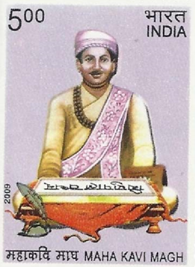Talk:The Generosity of Poet Māgha and his Wife
By Vishal Agarwal
The Saṃskṛta (Sanskrit) poet Māgha (7th century CE) is remembered not only for his literary brilliance but also for his exceptional generosity and compassion. Although he came from a prosperous background, his charitable nature and disregard for material wealth eventually led him to live in poverty during his later years.
Māgha was the author of the famous itihāsa of Kirātārjunīya, which celebrates the encounter between Arjuna and Bhagavān Śiva in the form of a hunter (kirāta). Yet, beyond his poetic mastery, he was equally revered for his kindness and humility.
One night, a poor man came to his door seeking help to arrange his daughter’s marriage. Māgha noticed that his wife, who was asleep, wore two gold bangles on her wrists. Quietly, he removed one of them and gave it to the needy man.
When his wife awoke and learned what had happened, she gently rebuked him, not for giving away her jewelry, but for giving too little. She said, “How can that man marry his daughter with only one gold bangle? Please take the other one as well and give it to him.”
This simple yet profound incident illustrates the spirit of compassion and selflessness that characterized both Māgha and his wife. Their story continues to serve as an example of true generosity, where giving is guided by empathy and the desire to relieve another’s suffering rather than by the thought of one’s own comfort or possessions.

